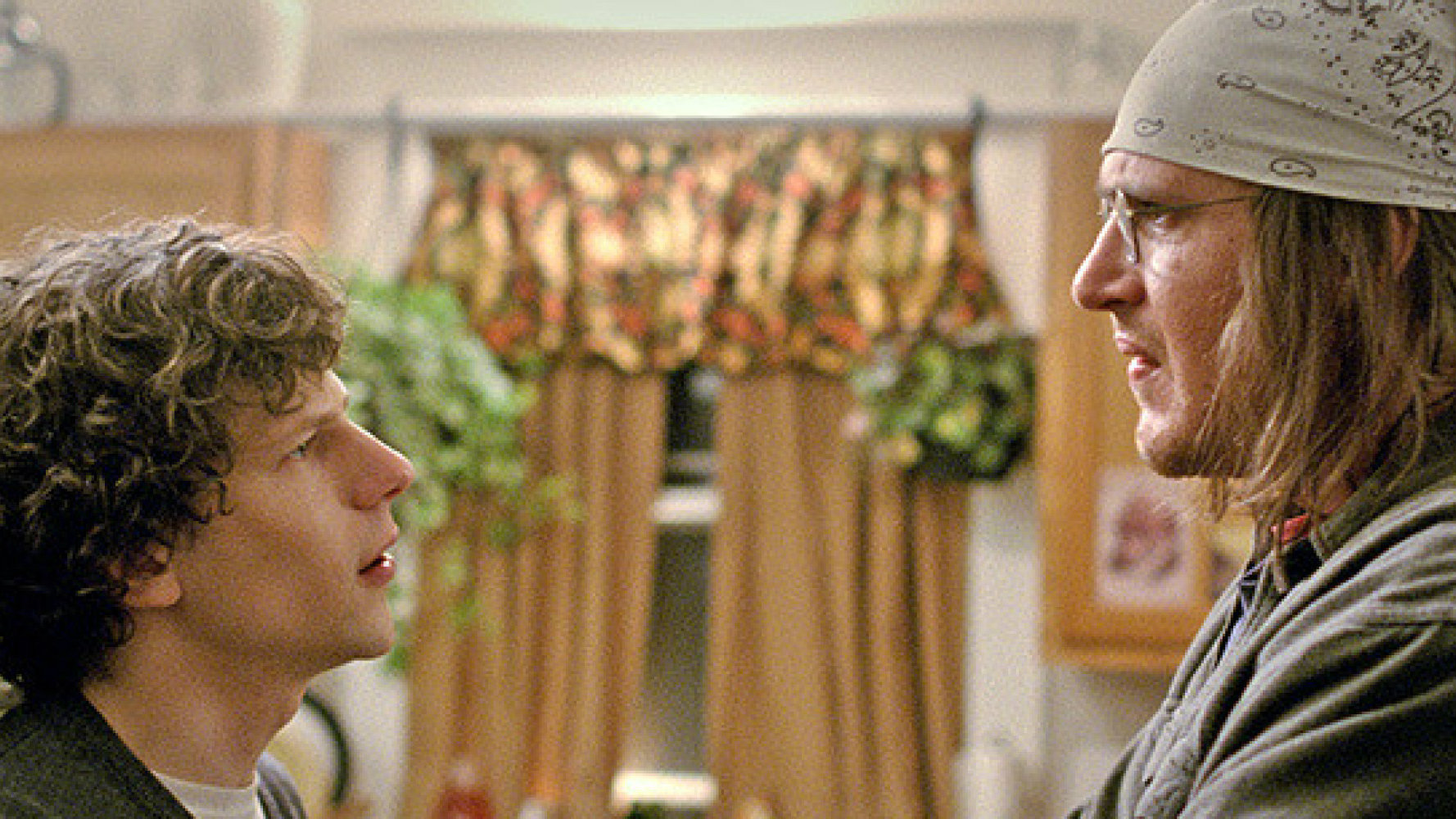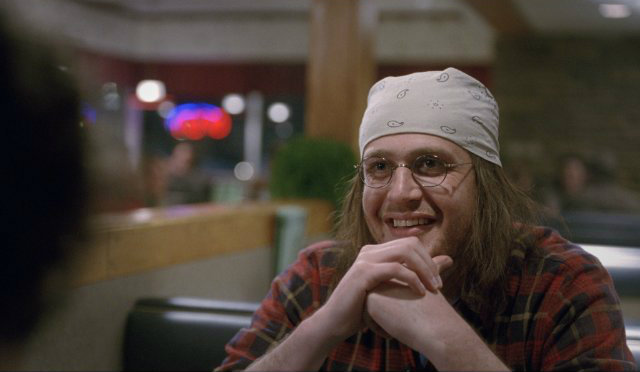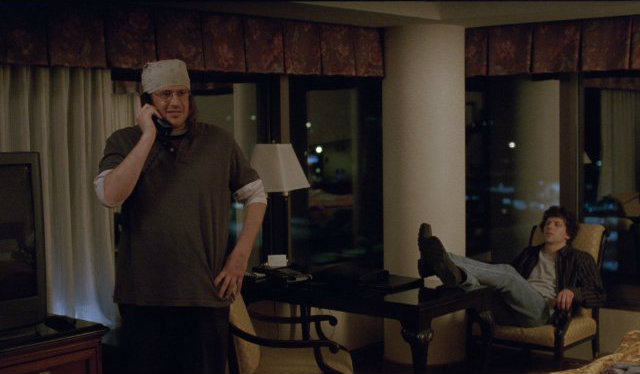 A24
A24The End of the Tour—based on the hybrid transcript/non-fiction Although Of Course You End Up Becoming Yourself by David Lipsky—shows that author David Foster Wallace is easy to represent in the abstract. In the wake of his suicide, Wallace left behind thousands of pages of fiction and non-fiction, as well as at least three collections of interviews (based on the contents of my bookshelves alone), from which to glean a rough impression of the depressive, genius author.
The film maybe hopes to reflect the mind of Wallace, and director James Ponsoldt decides that the best way to go about this is to have Jason Segel read quotes from Lipsky’s transcript. The result is simultaneously accurate and unremarkable. Segel portrays Wallace as schlubby, attention-shy, and a combination of externally friendly and closed-off; Jesse Eisenberg, playing Lipsky, plays Jesse Eisenberg.
The plot is both pretty bare and kind of structurally cringe-worthy. Lipsky—himself a struggling NYC-based author—decides to interview Wallace for Rolling Stone during the last leg of Wallace’s book tour for Infinite Jest, a book so lengthy and unrelentingly dense that its page count (1,096) has developed a kind of cabalistic significance amongst fans. The pair travel around the Midwest until returning home.
What makes the movie’s plot a bit wince-inducing is the unsubtlety with which Lipsky’s book—which is essentially a conversation between someone very well versed in existentialism and someone well-versed in what existentialism sounds like—was interjected with artificial conflict for the sake of adaptation. Although Of Course was already meandering and conversational in tone, with only tiny parenthetical (technically bracketed but whatever) asides from Lipsky to contextualize and segue.
But The End of the Tour I guess lacks faith in its audience’s ability to pay attention in the absence of Dumb Contrived Plot—so Lipsky gets mad at Wallace for upstaging Lipsky in front of his girlfriend, and Wallace gets mad at Lipsky for appearing to flirt with a college ex of Wallace’s, and the Bi-Davidic Duo spends twenty minutes in the middle of the movie being all huffy and standoffish with each other. These moments are tolerable at best and sitcom miscommunication-level bad at worst.
 A24
A24Segel’s performance as Wallace is good, but only good. Pre-release photos seemed to bode really pretty horribly for Segel—the picture I’m thinking of has him opposite a classically Eisenberg-faced Jesse Eisenberg, bandana-crowned, circle-specs donned, staring around in what looked like childlike wonder and awe at the Mall of America—but he manages to convey Wallace’s own subdermal discomfort.
What Segel can’t quite sell is the struggle Wallace had with his own everyday Joe Briefcase persona—the disparity between his own insistence on normality and others’ insistence on his genius, interacting with his desire to really actually be seen as genius, interacting with his knowledge that this desire itself is essentially toxic—etc., etc., recursive metacognition kind of being Wallace’s default wheelhouse.
Confusingly, the movie makes this issue one of the foremost sources of conflict between Lipsky and Wallace, the former arguing that his normal-guy appearance is a charade, and the latter arguing it isn’t. If Segel had managed to convey that Wallace was trying to convince himself as much as he was Lipsky, the point might’ve been more successful.
This review, though, does have a thesis: that the koan-like Wallacisms compiled in Although Of Course and recited in End of the Tour are the movie’s only real strength. The plot is mashed potatoes and the performances are fine, but this movie’s raison d’être seems to be as a delivery mechanism for Wallace’s thoughts about U.S. entertainment, fiction, and culture, as well as how lonely people are supposed to exist in a world so hell-bent on only making them lonelier.
 A24
A24However, it would be a mistake to equate the movie’s content with its subject matter. Wallace’s profundity can’t stand in for the film’s lack of focus. It’s not really about the friendship that arises between the Davids, nor is it itself about loneliness, or sadness, or envy. There are no arcs presented, just ones we hear about through time-skips and voiceovers.
It’s almost funny, then, that this movie is deserving of the same criticism that’s directed the way of many faith-based films: having characters say things in a movie does not make your movie “about” those things. The End of the Tour has that weird hollowness characteristic of plays that have been filmed for viewing elsewhere—there’s a nagging feeling that all the components on display are good, but that doesn’t mean that your experience of it is good, or full, or meaningful, or whatever.
The further irony (that, had this movie been about any other author, I would’ve omitted) is that Wallace himself clearly didn’t believe that the outright, uncomplicated presentation of allegedly True Stuff was the best way to communicate it. Infinite Jest has an often-quoted sequence in which a character lists off things you learn in rehab, all of which are very deep-seeming and meaningful and poignant and above-all quotable; but it leads people to forget that the book has 1,095 other pages of material, and that Wallace considered it all instrumental to really understanding what he was talking about.
 A24
A24This extends toward re-presentations of the Kenyon Commencement Address “This is Water” (which are available in both coffee table book and cutesy animated short form), where people want only the most-distilled, most easily digestible version of a thought. It’s a kind of TED Talk mentality of perpetual condensation—shorter, quicker, more accessible, easier.
And it’s not like this is something new to human nature, either. It’s just that the scale on which we (as an audience) are able to consume pre-packaged little bites of Meaningfulness and Poignancy is like a power-function ahead of where we were even ten years ago.
It’s maybe true that you have to start simple before you can understand something in depth—like the old favorite about history classes teaching, over the course of 12 years, that the Civil War was, and then wasn’t, and then mostly really was all about slavery. The problem arises when the over-simplified, radically condensed overviews start to be taken—and start to present themselves—as complete ends-in-themselves, rather than as interest-piquing devices.
So if The End of the Tour is going to operate in that latter register, pulling attention toward the author and his viewpoints in a way that makes people want to learn more and think about the serious concerns Wallace raised—then the project is a success, and deserves more stars than I’m going to give it, and my criticisms wouldn’t be valid.
But I think the movie’s presentation and packaging are just a little too slick and self-contained, for that—and worry that people will mistake what is essentially an arrow pointing toward meaningfulness for meaningfulness itself. (Though—it goes without saying that this is just one person’s opinion.)
Caveat Spectator
There’s some language—a smattering of F-words and maybe some of the harsher second-tiers, though nothing in the film stuck me as really hard-line offensive or deserving of an R-rating at all. (My pet theory is that the rating was achieved for the sake of appearing artsy and high-brow, which has the side-effect of barring from entry the very 16- and 17-year-olds on whose intellectual register the film operates—but this is an altogether uncharitable and kind of mean-spirited take on the movie’s rating, so take it with a grain of salt.)
Jackson Cuidon is a writer who lives in New York City with his wife and dog. Sometimes he tweets @jxscott.













